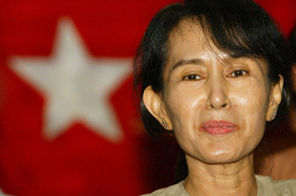Final day of Suu Kyi trial
YANGON: The trial of Myanmar democracy leader Aung San Suu Kyi was expected to wrap up Tuesday as defence lawyers made a final desperate bid to save her from up to five years in jail, officials said.
Myanmar's ruling junta has drawn international condemnation for prosecuting the detained Nobel peace laureate on charges of breaching the rules of her house arrest after an American man swam to her lakeside house in May.
Lawyers for Suu Kyi, her two female aides and US national John Yettaw replied to closing arguments presented by prosecutors on Monday to the court at Yangon's notorious Insein prison, a Myanmar official said.
Nyan Win, one of Suu Kyi's lawyers, said the defence would also try to call a witness from the foreign ministry to clarify whether Suu Kyi had officially been arrested on criminal charges or detained for her own security.
"I do not think the court will give a verdict" on Tuesday, said Nyan Win, who is also the spokesman for her National League for Democracy (NLD) party.
Nyan Win said earlier this week that judges would likely take up to three more weeks to reach a verdict, which is widely expected to be a guilty one given the previous form of the military-ruled nation's courts.
The Myanmar official, speaking on condition of anonymity, said diplomats from Thailand, Japan, Singapore and the United States attended Tuesday's hearing.
The case has been repeatedly delayed amid signs that the regime is trying to seek a way of quelling the storm of international outrage over its treatment of 64-year-old Suu Kyi.
U2 singer Bono publicly announced during a concert in Dublin on Monday that Suu Kyi had been named Amnesty International's ambassador of conscience for 2009, the rights group's highest honour.
Critics have accused the junta of trying to keep Suu Kyi locked up ahead of elections next year, and US Secretary of State Hillary Clinton led calls for her release at an Asian security conference last week.
Suu Kyi has been in jail or under house arrest for 13 of the last 19 years since the junta refused to recognise the NLD's landslide victory in Myanmar's last national elections, in 1990.
Her lawyers say that she was not responsible for the intrusion by Yettaw -- who has said that he was inspired by a divine vision that she would be assassinated -- and that she was charged under outdated laws.
But Myanmar's rulers have strongly defended the trial.
State media on Tuesday made the strongest suggestions yet that Yettaw was an agent of an outside power, possibly the United States, and was trying to smuggle Suu Kyi out of detention.
The New Light of Myanmar newspaper printed a bizarre editorial in the form of a "dialogue" between a grandfather and grandson commenting on the visit earlier this month of UN chief Ban Ki-moon, who was refused access to Suu Kyi.
It said the trial "has not been intentionally created by the government" but was the fault of Yettaw, who "might have been sent to the country by an anonymous country or organisation".
"The aim of his meeting with Daw Suu Kyi has not been known clearly. He even left two chadors (Muslim shawls) and dark sunglasses to her to act herself in disguise. Was it aimed at taking her out of the house?" it said.
The newspaper also pointed out that the route Yettaw used to enter her house was the "ditch beside the US embassy" and said the place he was arrested was 25 yards (metres) from the house of the US charge d'affaires.
"So there are many points to ponder," the editorial said.
Myanmar officials have previously blamed "anti-government elements" including exiled dissidents for Yettaw's visit and alleged that he was a "secret agent or her (Suu Kyi's)" boyfriend.






